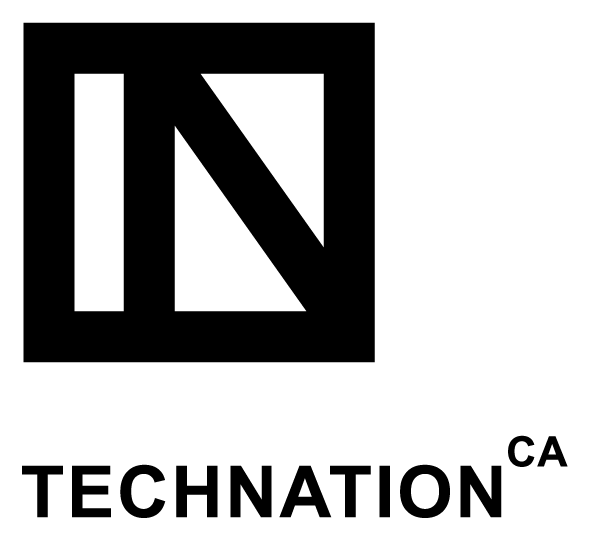Experts Blog
The need for Health Informatics research and its application, eHealth, is even more important today than ever, because today we find ourselves far less limited by the technology but still restricted by our ideas, knowledge, creativity and understanding of our health systems and human factors.
The NIHI Blog is dedicated to fostering knowledge of our health systems and human factors, and inspiration for new and better ways. Check back often for new posts from NIHI's group of expert contributors.

Proving ROI: The Art (and Science) of Storytelling in Health Care
Renee Sutton, Content and Media Specialisit; National Institutes of Healthcare Informatics
Posted on September 11, 2025
When we hear “ROI” in health care, our minds often jump to spreadsheets, formulas, and cost–benefit analysis. And yes, rigorous measurement is very important, but proving ROI isn’t only about the math. It’s about taking that data, and telling the story around it that resonates, persuades, and sustains change.
Why Numbers Alone Aren't Enough
Every initiative leaves a trail of evidence: clinical outcomes, patient satisfaction, efficiency gains, financial impact. But numbers, no matter how accurate, rarely speak for themselves standalone.
Stakeholders want more than raw data — they want to understand what it means:
- What problem did we set out to solve?
- How do these results show that we succeeded?
- Why does it matter enough to continue?
That’s where the art comes in. The Phillips ROI Methodology provides a disciplined way to measure and calculate value. Storytelling gives those findings context and resonance, ensuring they move people to act.
The Balance of Science and Story
This course will help you master both sides of ROI thinking:
The Science:
- Defining clear program objectives.
- Following the 12-step ROI methodology.
- Isolating benefits from other variables.
- Translating impact into monetary terms with precision.
The Story:
- Framing results as a narrative that resonates with executives, funders, and teams.
- Linking metrics to mission and meaning.
- Demonstrating not just what changed, but why it matters.
- Together, the science and the story make ROI both credible and compelling.
Why This Matters in Health Care
In today’s environment, good ideas don’t always survive unless their value is proven. By blending rigorous methodology with persuasive communication, health care leaders can:
- Secure funding to sustain critical programs.
- Earn buy-in from executives and policymakers.
- Build trust among clinicians and staff.
- Ensure that innovation translates into positive change.
Who Should Learn ROI Thinking
This program is designed for:
- Health care executives and project leaders,
- Quality improvement professionals and evaluators,
- Financial officers and policy analysts,
- Consultants and solution providers who need to demonstrate impact.
If you need to prove that what you’re doing makes a difference, this course is for you.
Proof that Resonates
ROI in health care is not about reducing vision to numbers. It’s about combining the science of measurement with the art of storytelling — so that outcomes are not only proven, but understood, valued, and sustained.
This fall, join NIHI–McMaster CE’s ROI in Health Care course and learn how to master both.
Registration now open: https://nihi.ca/index.php?MenuItemID=615
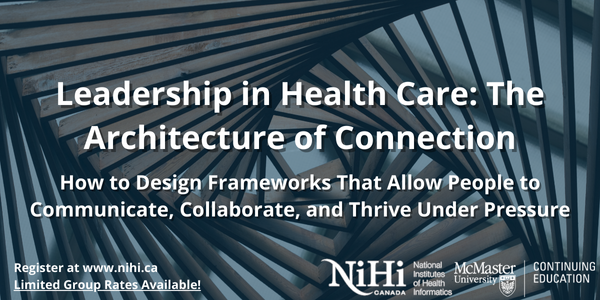
Leadership in Health Care: The Architecture of Connection
Renee Sutton, Content and Media Specialisit; National Institutes of Healthcare Informatics
Posted on September 11, 2025
When we think of leadership, we often imagine the individual at the top — a decisive voice, and guiding presence. But in health care, leadership is less about standing above, and more about what you build around you.
Leaders are architects of connection. They design the frameworks that allow people to communicate, collaborate, and thrive under pressure. And like any structure, the strength of a team depends not on one beam but on how every element is joined.
Why Leadership is More Architecture, Less Authority
A hospital ward, a research unit, or a public health team doesn’t function because of hierarchy alone. It functions because someone:
Creates shared language where confusion could take root.
Builds resilient systems that hold in crisis and bend without breaking.
Designs spaces of trust where conflict can be worked through instead of ignored.
This is leadership as architecture: careful design, intentional reinforcement, and the courage to remodel when cracks appear.
What This Course Offers
NIHI–McMaster CE’s Leadership in Health Care: Learning to Lead course reframes leadership as a practice of building — not just managing. Across nine sessions, you’ll explore:
- Communication as scaffolding — how to create clarity within and beyond your team.
- Conflict as structural testing — using friction to strengthen rather than weaken relationships.
- Collaboration as design — building high-performing, interdisciplinary teams that hold together under pressure.
- Crisis as stress test — learning to adapt when conditions change suddenly.
- Self-leadership as foundation — because no structure stands without a solid base.
Who Should Enrol
This program is designed for anyone who finds themselves in a position where others look to them for guidance — whether you’re:
- A manager or team lead,
- A health professional or allied health leader,
- A public health professional navigating cross-disciplinary collaboration,
- Someone aspiring to grow into a leadership role,
- An executive who wants to further build their leadership skills
The Future Needs Builders
Leadership in health care is not about having all the answers. It’s about building the structures that allow others to find them together.
This fall, join NIHI–McMaster CE’s Leadership in Health Care: Learning to Lead course and become an architect of connection, clarity, and resilience in your organization.
Register now: https://www.nihi.ca/index.php?MenuItemID=627
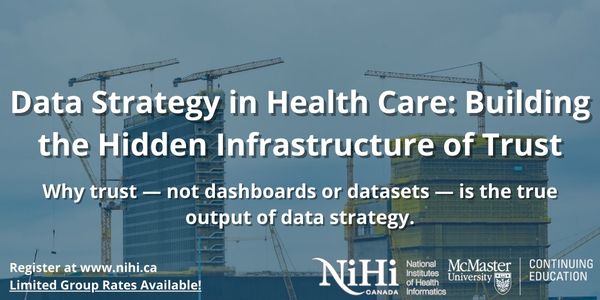
Data Strategy in Health Care: Building the Hidden Infrastructure in Trust
Renee Sutton, Content and Media Specialisit; National Institutes of Healthcare Informatics
Posted on September 2, 2025
When people think of health care infrastructure, they imagine hospitals, equipment, or electronic records. But there’s another system holding it all together: trust.
Trust is what allows a patient to share their most sensitive information. It’s what gives a clinician the confidence to rely on a dashboard in a critical moment. It’s what enables leaders to make bold, evidence-informed decisions.
Without data that is secure, well governed, and reliably understood, this trust ceases to exist. With it, data becomes a foundation for action. And this is exactly what a data strategy is designed to deliver — a framework for transforming raw information into reliable insight. Not just better data, but better trust.
Why Data Strategy = Trust Strategy
A strong data strategy isn’t about stockpiling numbers or adding new software. It’s an organizational blueprint that ensures:
- Governance — Patients and staff know data is secure, compliant, and ethically handled.
- Culture — Everyone from executives to front-line staff is confident in using data because they understand it.
- Alignment — Data initiatives support organizational goals and patient outcomes, rather than pulling in different directions.
- Responsible Innovation — Advanced tools like AI are evaluated for efficacy, fairness, transparency, and alignment with patient-centered values.
Turning Strategy Into Action
A strong data strategy is how organizations engineer trust.
The NIHI–McMaster CE course on Data Strategy for Health Care Organizations is designed to move you from abstract principles to practical skills. You’ll learn to:
- Design a roadmap that connects organizational vision to data initiatives.
- Build confidence in analytics by addressing bias, ethics, and responsible AI use.
- Create structures that support data literacy so insights can be trusted and acted upon.
- Implement methods for evaluating success, ensuring strategies evolve with your organization.
And much more! This isn’t about theory for theory’s sake — it’s about putting strategy to work in the messy, complex realities of health care.
Trust is the Output
At the end of the day, the most advanced analytics or AI tool is useless if people can’t trust the result. That’s why trust — not dashboards, not datasets — is the real output of a well-designed data strategy.
This fall, join NIHI–McMaster CE’s Data Strategy for Health Care Organizations course and learn how to move beyond “data-rich, insight-poor” to build systems that people can trust — and act on.
Learn more and register now at https://nihi.ca/index.php?MenuItemID=659
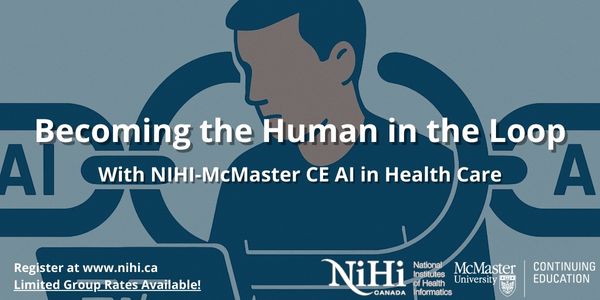
Becoming the Human in the Loop
Renee Sutton, Content and Media Specialisit; National Institutes of Healthcare Informatics
Posted on August 21, 2025
The conversation about Artificial Intelligence in health care often swings between two extremes: excitement about its potential, or anxiety about its risks. But the truth is, AI is not here to replace health care professionals — it’s here to work alongside them.
That’s where “human in the loop” comes in. It means that, even as algorithms learn and adapt, people are still essential for guiding, validating, and improving the system. In health care this role is irreplaceable.
Why This Matters Now
Every day, health care teams are faced with decisions that blend science, technology, and evolving compliance and ethics. AI can process millions of data points, but it can’t weigh the human cost of a decision. That’s the domain of the clinician, the analyst, the leader — you.
This fall, NIHI–McMaster Continuing Education’s AI in Health Care course is designed to help you step confidently into that role. You’ll learn the language of AI — machine learning, neural networks, natural language processing — so you can engage in conversations that shape the way technology is used in your organization. You’ll also explore ethical and regulatory frameworks, ensuring that AI solutions are safe, equitable, and aligned with public health goals.
From Technology Consumer to Technology Shaper
Many professionals use AI tools without ever knowing how they work or what’s behind their recommendations. This course will help you move from passive user to active shaper:
- Interpreting AI outputs with a critical eye
- Spotting bias before it affects patient outcomes
- Asking the right questions when vendors promise “game-changing” solutions
- Building business cases that factor in more than just cost savings
Bringing the Human Back Into Tech
When you complete this program, you’ll have more than a microcredential — you’ll have the confidence to take a seat at the table where AI decisions are made. Because in the end, AI doesn’t just need data. It needs humans who understand care, context, and consequence.
Join us for AI in Health Care and become the kind of professional who doesn’t just keep up with technology — but leads it where it needs to go.
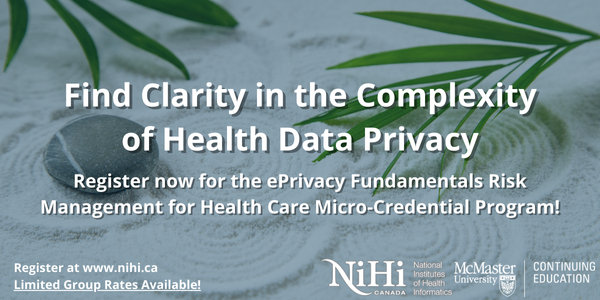
Find Clarity in the Complexity of Health Data Privacy
Renee Sutton, Content and Media Specialisit; National Institutes of Healthcare Informatics
Posted on April 18, 2025
Like the quiet simplicity of a zen garden, understanding privacy can be a process of clearing away what’s unnecessary, and focusing on what truly matters. That’s the goal behind ePrivacy Risk Management—a micro-credential program designed to bring clarity to a complex subject.
This course offers more than just checklists and policies. It helps you build a practical understanding of how privacy principles apply to real-world healthcare settings. Whether you're managing patient data, working with digital tools, or leading a team through a privacy audit, you’ll walk away with confidence and clarity.
You don’t need to be a legal expert or a tech expert to benefit. You just need a willingness to learn the essentials—and a little guidance in organizing them.
What You’ll Gain:
- Guidance in tools like PIA and Risk Management Assessment
- A grounded understanding of privacy legislation in Canada
- Insight into risk management practices tailored to healthcare
- Tools to support ethical, compliant data handling
- Confidence in addressing privacy challenges in a digital-first environment
Why It Matters
Health data is personal, powerful, and sensitive. Mishandling it can damage trust, affect outcomes, and bring real-world consequences. The best time to build your foundation in privacy? Before you’re faced with a crisis.
This course gives you the tools to feel prepared, not panicked.
A Simpler Way Forward
Just like raking lines in sand or placing stones with intention, building privacy literacy is about slowing down and setting the right foundation. When you understand the landscape, you can move through it with purpose—and help your organization do the same.
Ready to find clarity in the complexity?
Register now for the ePrivacy Risk Management micro-credential program.
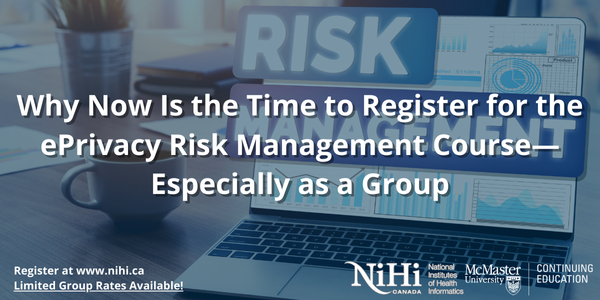
Why Now Is the Time to Register for the ePrivacy Risk Management Course—Especially as a Group
Renee Sutton, Content and Media Specialisit; National Institutes of Healthcare Informatics
Posted on April 9, 2025
Earlier this month, news broke that a data breach involving a regional health authority in British Columbia led to compromised Canada Revenue Agency accounts and leaked Social Insurance Numbers. This serves as a chilling reminder that even health authorities—entrusted with deeply personal information—are vulnerable in today’s digital landscape.
For individuals and organizations alike, this is yet another wake-up call: data breaches are not just a risk—they’re an everyday reality.
In this case, thousands of people had their sensitive information exposed. Some discovered their CRA accounts had been hacked. Others learned their SIN numbers had been compromised. The consequences are serious, long-term, and in some cases, irreversible. And like so many cyber incidents, it was only discovered after damage had already been done.
These ongoing breaches show us one thing clearly: we can’t afford to be unprepared.
This isn’t a one-off. It’s part of a growing pattern. And it reinforces exactly why the ePrivacy Risk Management course exists: to help people and organizations understand their risk, build digital resilience, and prevent this kind of harm before it happens.
The ePrivacy Risk Management Course: More Essential Than Ever
Whether you manage a business, lead a nonprofit or hospital team, oversee a local government team, or are simply responsible for others' personal information, this course gives you the practical tools and frameworks to:
- Recognize where your systems are most vulnerable
- Understand your legal and ethical responsibilities
- Create a digital risk plan that works in real life
- Train your staff and team to think proactively about cybersecurity
It’s not technical, overwhelming, or out of reach—it’s actionable, accessible, and made for real-world use.
Why You Shouldn’t Wait
1. These incidents are happening more frequently—and to organizations just like yours.
Hospitals and health authorities are major public bodies with resources. If they can be compromised, so can smaller organizations with fewer staff and safeguards.
2. Damage control is expensive. Prevention is affordable.
Recovering from a breach costs far more and is more disruptive than building protections in the first place. Education is a low-cost, high-impact investment.
3. Health-Related Data Is a Prime Target.
Health records, insurance details, and SIN numbers tied to health systems are some of the most valuable data types for cybercriminals. If your organization works with—or even indirectly touches—health-related information, you are holding a bullseye. This course helps you understand how to manage and protect that data responsibly.
Group Registration = Even Greater Benefits
If you register as a group, the benefits compound:
- Shared understanding = stronger outcomes. Teams that learn together, plan and respond better.
- Discounted rates = more accessible protection. We offer group pricing so organizations can equip more people without breaking the budget.
- Momentum = culture change. When multiple team members take the course, it kickstarts conversations, policies, and practices that ripple throughout the organization. More people can implement changes faster.
Whether you're part of a hospital, clinic, healthcare organization, nonprofit board, a government department, or a company, large or small, registering as a group gives you a common language and a shared approach to cyber preparedness.
Don’t Be the Next Headline
The health authority breach is just the latest example. If your organization has personal, financial, or health data—even in small amounts—you have a responsibility to manage digital risk.
The best time to prepare was yesterday. The next best time is now. Register for the ePrivacy Risk Management course today—and if possible, register as a group. You’ll be building the kind of resilience that today’s digital world demands.
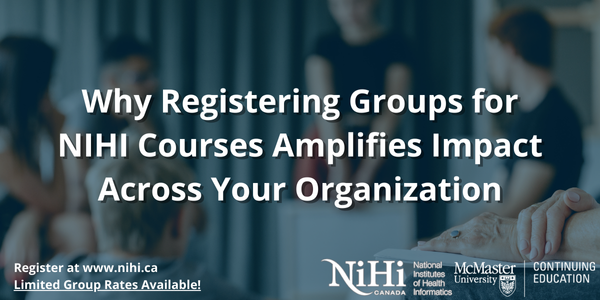
Why Registering Groups for NIHI Courses Amplifies Impact Across Your Organization
Renee Sutton, Content and Media Specialisit; National Institutes of Healthcare Informatics
Posted on March 27, 2025
At the National Institute of Health Informatics (NIHI), we’re proud to offer NIHI-McMaster microcredential courses that support healthcare professionals in navigating the rapidly evolving landscape of health IT. While individuals gain significant value from our courses, registering groups of professionals from the same organization takes that value to the next level—with benefits that ripple across entire teams, departments, and institutions.
That’s why we offer 15% off group registration.
Here’s why group registration matters:
1. Foster a Shared Language and Vision
When multiple team members engage with the same course material, they develop a shared understanding of key concepts, tools, and strategies. This common ground makes collaboration smoother and strengthens alignment across departments—whether it's IT, clinical operations, or administration.
2. Turn Insight into Organizational Action
Learning in a group allows for immediate dialogue on how new ideas can be applied within the unique context of your organization. Teams can brainstorm, adapt, and implement solutions more effectively when everyone is operating from the same knowledge base.
3. Create a Culture of Continuous Improvement
Registering groups signals an institutional commitment to learning and innovation. It cultivates a culture where staff feel empowered to explore new approaches, solve problems collaboratively, and stay ahead in a rapidly changing health care environment.
4. Multiply the Return on Investment
The benefits of group learning are exponential. One informed individual can make a difference—but an entire team equipped with the same knowledge can transform systems, improve workflows, and enhance patient outcomes more swiftly and sustainably.
Whether you’re looking to upskill your employees on privacy and risk management, empower your clinical leadership team with tools to foster strong cultures, or bridge the gap between technological advancements like AI and care delivery, group registration at NIHI is a strategic step toward real organizational growth.
Ready to learn together? Check out our Spring Programs!
March 31, April 14 & 28 - LAST CALL TO REGISTER
ePrivacy Fundamentals
Online
https://nihi.ca/index.php?MenuItemID=659
April 3 - June 19 - LAST CALL TO REGISTER
Introduction to Artificial Intelligence
Online
https://nihi.ca/index.php?MenuItemID=590
April 15 - June 17 - LAST CALL TO REGISTER
Development of Effective Dashboards for Health Care
Online
https://nihi.ca/index.php?MenuItemID=637
April 16 - June 11 - LAST CALL TO REGISTER
Leadership in Health Care: Leading Change
Online
https://nihi.ca/index.php?MenuItemID=666
May 12, 26, and June 9 – TAKE BOTH EPRIVACY COURSES FOR SPECIAL BUNDLE PRICE
ePrivacy Risk Management
Online
https://nihi.ca/index.php?MenuItemID=649
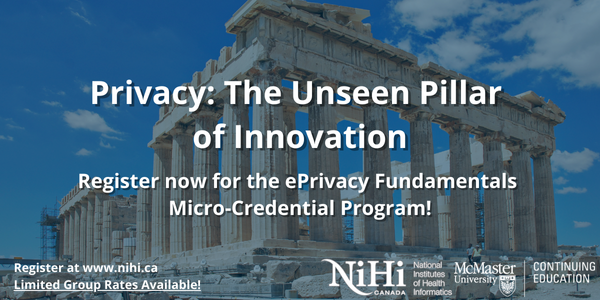
Privacy: The Unseen Pillar of Innovation
Renee Sutton, Content and Media Specialisit; National Institutes of Healthcare Informatics
Posted on March 27, 2025
When we think of cutting-edge health care—AI-driven diagnostics, virtual care platforms, or wearable health devices—it’s easy to focus on the beneficial possibilities, while the potential for risks silently looms in the background. Data breaches are no longer rare; they’re expected, if privacy isn’t managed correctly. What’s more, global privacy laws are tightening. For healthcare professionals, staying on top of these developments isn’t optional—it’s essential.
In order to foster innovation, we need to foster an environment where patients and legislative bodies can confidently embrace new technologies, knowing their data is safe. By building strong privacy programs, healthcare organizations foster trust, which in turn fuels adoption and collaboration. Innovation thrives not in spite of privacy protections, but because of them.
Why This Course Matters Now
The ePrivacy Fundamentals course equips participants with the tools to not just comply with regulations, but to lead in creating a culture of privacy that supports both care delivery and cutting-edge advancements.
Beyond the Basics: What You’ll Gain
Unlike generic training programs, the ePrivacy Fundamentals course dives deep into the unique challenges of health care. Here’s what makes it a must have for healthcare professionals:
- Practical Skills for Real Risks: Learn to navigate privacy breaches, implement effective governance, and address AI-specific risks.
- National and Global Perspective: With a curriculum covering Canadian and international laws, touching on the newly introduced legislation in Quebec, and the reforms that will continue both provincially and federally throughout the year, you’ll gain insights that apply within provincial and beyond international borders
- Expert Instruction: Learn from seasoned industry experts, like Patrick Lo and Brendan Seaton, whose combined expertise in privacy and healthcare spans decades.
- Empowerment Through Knowledge: Did you know that 90% of breaches stem from human error? Proper training reduces these risks significantly—by up to 60%!
Take the Next Step
Don’t wait for the next breach to expose vulnerabilities in your system. Be proactive. Be prepared. Enrol in the ePrivacy Fundamentals Microcredential program today, and take the first step toward building a future where healthcare innovation and privacy go hand in hand. Your organization—and the patients you serve—will thank you.
Join the movement to make privacy the foundation of healthcare innovation.
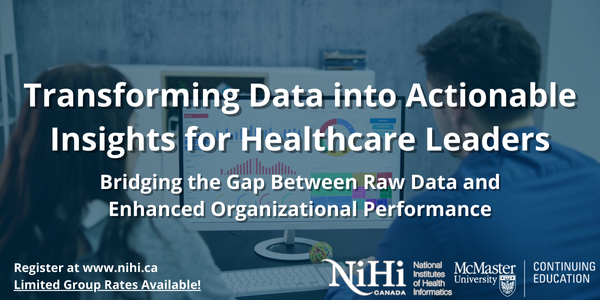
Transforming Data into Actionable Insights for Healthcare Leaders
Renee Sutton, Content and Media Specialisit; National Institutes of Healthcare Informatics
Posted on March 26, 2025
Healthcare organizations are rich in data, but without the right tools, this wealth of information can go underutilized. As digital transformation accelerates, healthcare leaders must harness data effectively to make informed, strategic decisions. The key to this lies in the development of effective data visualization tools—interactive and user-friendly dashboards that provide real-time insights, improve operational efficiency, and enhance patient care.
The Role of Dashboards in Healthcare Decision-Making
Dashboards are more than just displays - they bridge the gap between raw data and actionable insights. By consolidating data from various sources, they enable healthcare leaders to track trends, identify inefficiencies, and make data-driven decisions that enhance organizational performance. A well-designed dashboard ensures that complex healthcare data is not just available but is also comprehensible, accessible, and actionable.
Key Challenges and Opportunities in Dashboard Development
While dashboards offer immense benefits, their development is not without challenges. Healthcare organizations must navigate issues such as data integration across different systems, ensuring user adoption, and designing dashboards that provide meaningful insights rather than just presenting overwhelming amounts of data. Opportunities lie in employing best practices in UI/UX design, leveraging iterative development methodologies, and focusing on data storytelling to improve engagement and usability.
Essential Components of Effective Healthcare Dashboards
- Iterative Dashboard Development Methodology: A structured approach that allows for continuous refinement based on user feedback.
- Consumer-Driven Data Visualization Framework: A methodology for gathering user requirements and designing dashboards that cater to the needs of healthcare professionals.
- Foundations of Data Storytelling: Creating dashboards that not only present data but also provide context and meaning.
- UI/UX Principles and Wireframing: Ensuring that dashboards are intuitive, user-friendly, and accessible to a diverse range of healthcare professionals.
- Data Visualization Selection Process: Choosing the right types of charts, graphs, and visual elements to best represent healthcare data.
- Dashboard Layout & Structure with the Guided-Analytics Approach: Organizing dashboard components to facilitate a seamless user experience.
- User Training & Dashboard Sustainment: Implementing strategies to ensure healthcare professionals can effectively use and maintain dashboards over time
- Measuring Adoption & Governance of Dashboards: Ensuring the long-term success of dashboards through structured evaluation and governance models.
Why Healthcare Professionals Need to Master Dashboard Development
Understanding the development and implementation of effective dashboards is essential for healthcare professionals involved in decision-making. Interactive dashboards not only enhance data interpretation but also promote collaboration among clinicians, administrators, and data analysts. Mastering dashboard development allows professionals to:
- Prepare dashboards that facilitate data-driven decision-making in healthcare organizations.
- Showcase data visualization techniques to effectively communicate with data.
- Demonstrate effective change management practices for dashboard adoption.
- Identify the critical inputs, enablers, and context in dashboard development that generate tools healthcare leaders will actually use.
- Learn from real-life case studies how dashboards have been successfully deployed to improve performance in healthcare settings.
- Understand analytics team governance and how to lead teams in developing dashboards that healthcare leaders actively seek out.
Learn How to Build and Implement Effective Dashboards with NIHI
The National Institutes of Health Informatics offers a specialized program designed to provide healthcare professionals with practical skills in dashboard development. Development of Effective Dashboards for Health Care outlines a structured approach to designing, implementing, and adopting dashboards that healthcare leaders will actually use. This program covers:
- Best practices for dashboard development and strategies for successful adoption.
- Agile project management techniques for building effective healthcare dashboards.
- AI and big data analytics in healthcare.
- Dashboard design principles for intuitive data visualization.
- Electronic health records (EHR) integration.
- Privacy, security, and compliance in digital health.
- Practical applications of interactive dashboards in healthcare management.
By mastering these skills, healthcare professionals can leverage data visualization to drive efficiency, improve patient outcomes, and enhance organizational performance.
Stay ahead of the decision-making process—enrol in the NIHI health informatics Development of Effective Dashboards for Health Care today and take control of healthcare data with effective dashboard development!
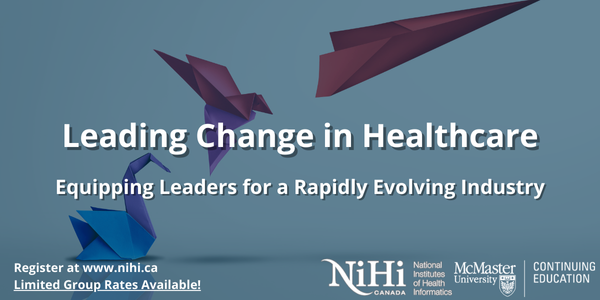
Leading Change in Healthcare: Equipping Leaders for a Rapidly Evolving Industry
Renee Sutton, Content and Media Specialisit; National Institutes of Healthcare Informatics
Posted on March 14, 2025
Effective leadership is essential for navigating change and driving meaningful improvements. When organizational decisions and adaptations directly impact lives, in an industry that’s constantly evolving, strong leadership is not just beneficial, it’s critical to the well-being of both patients and health care professionals.
As the industry faces increasing challenges—staffing shortages, shifting regulatory policies, and the continued evolution of digital health solutions—healthcare leaders must adopt strategies that ensure successful adaptation and progress.
Preparing Leaders to Drive Change
Change leadership in healthcare requires a unique blend of vision, strategy, and human-centered approaches. It’s not just about implementing new technologies or processes—it’s about fostering a culture that embraces change, ensuring teams are engaged, and creating an environment where innovation thrives.
This course is designed to equip both current and aspiring healthcare leaders with the skills and tools to implement and sustain successful change initiatives. Participants will explore key concepts such as:
Fostering an adaptable culture that values innovation and continuous improvement.
Engaging teams and individuals through effective communication and motivation strategies.
The role of vision and strategy in guiding transformation initiatives.
Addressing resistance to change and overcoming common barriers.
Measuring progress and success using data-driven decision-making.
Implementing sustainable change frameworks that align with organizational goals.
Through a blend of strategic visioning, human-centered approaches, and real-world examples—including the integration of AI and workforce modernization—participants will gain critical skills in change planning, communication, and overcoming barriers.
Whether you're managing a healthcare team, leading system-wide initiatives, or preparing for future leadership roles, this program provides the knowledge and strategies needed to confidently guide individuals and organizations through transformations.
Navigating Change in a Digital Healthcare Era
The modern healthcare system is undergoing a digital revolution, and leaders must be at the forefront of this transformation. With AI-powered diagnostics, electronic health records, and telemedicine reshaping patient care, healthcare professionals must be prepared to guide their organizations through these advancements. This course places a strong emphasis on how to strategically integrate digital tools while maintaining a human-centered approach to healthcare delivery.
Who Should Enroll?
This course is ideal for:
Healthcare managers and leaders looking to strengthen their change leadership capabilities.
Public health professionals and allied health workers aiming to implement new initiatives in their organizations.
Aspiring leaders seeking to advance their careers by mastering the art of change leadership.
Health educators and researchers who play a role in shaping the future of healthcare policies and practices.
Building Resilient, Future-Ready Organizations
The ability to navigate change effectively is what separates thriving healthcare organizations from those that struggle with adaptation. Leaders who can articulate a clear vision, engage their teams, and measure progress are better equipped to create lasting, positive change.
Now more than ever, the healthcare industry needs leaders who can embrace transformation with confidence. By equipping yourself with the right skills, you can lead your organization—and the healthcare sector as a whole—toward a more efficient, patient-centered, and innovative future.
Join us in this course to build the leadership capabilities needed to navigate the complexities of change and drive meaningful improvements in healthcare. The future of healthcare depends on leaders like you.
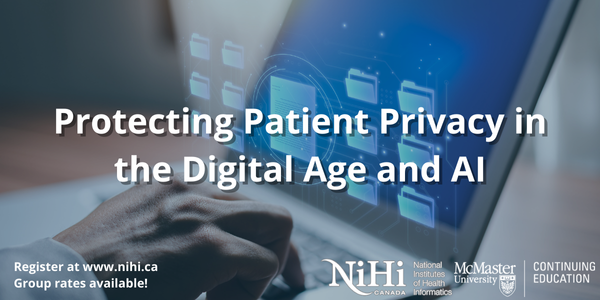
Protecting Patient Privacy in the Digital Age and AI
Renee Sutton, Content and Media Specialisit; National Institutes of Healthcare Informatics
Patrick Lo, CEO, Privacy Horizon Inc.; NIHI Instructor
Brendan Seaton, Former Chief Creative Officer, Privacy Horizon Inc.; Privacy By Design Ambassador; Past President, ITAC Health; NIHI Instructor
Posted on: March 4, 2025
Protecting Patient Privacy in the Digital Age: Why ePrivacy Training is a Must
There is no question about whether healthcare organizations should protect privacy, it’s a matter of how well they’re doing it. As the innovative landscape continues to grow in complexity, adding new and complicating factors, data breaches become increasingly common, and regulations tightening worldwide, professionals in the healthcare industry must stay ahead of evolving threats by evolving themselves.
The Growing Threat to Health Data
From ransomware attacks on hospitals to patient records being leaked on the dark web, the healthcare sector has become a prime target for cybercriminals. In 2024 alone, multiple high-profile breaches exposed millions of patient records, raising alarms about the vulnerabilities in digital health systems. Canadian Privacy laws are enforcing stricter compliance measures, making privacy training evermore essential.
The NIHI-McMaster CE Solution - ePrivacy Fundamentals & ePrivacy Risk Management
ePrivacy Fundamentals provides a solid foundation in health information privacy, helping professionals understand core privacy principles, compliance requirements, responsible use of AI and best practices for handling sensitive patient data.
ePrivacy Risk Management goes a step further, equipping learners with tools to assess, mitigate, and respond to privacy risks effectively. With real-world case studies and practical strategies, impact of AI and tools like Privacy Impact Assessment, and Threat and Risk Assessment, participants will be better prepared to protect against and handle privacy incidents before they escalate.
Not only will these courses help prepare you to better handle increasingly complicated privacy risks and concerns, and certify you with microcredentials, but ePrivacy Risk Management is also eligible for PACC professional development credits!
Future-Proof Your Career in Healthcare Privacy
With global data protection laws evolving rapidly, healthcare professionals who upskill in privacy management will add immense benefit to their organizations, and will be in high demand. Whether you're a healthcare provider, IT specialist, compliance officer, or policymaker, these courses offer invaluable insights into safeguarding patient data in a progressively digital world.
Don’t wait until the next breach makes headlines - stay proactive and enroll today for ePrivacy Fundamentals and eRisk Management!
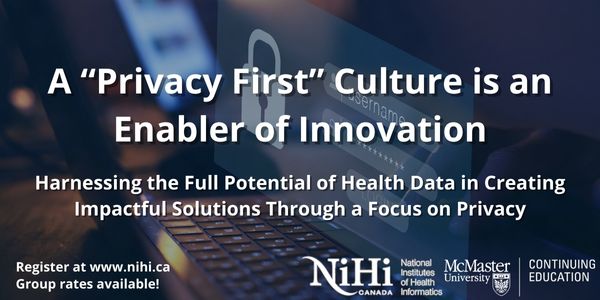
A "Privacy First" Culture is an Enabler of Innovation
Renee Sutton, Content and Media Specialisit; National Institutes of Healthcare Informatics
Patrick Lo, CEO, Privacy Horizon Inc.; NIHI Instructor
Brendan Seaton, Former Chief Creative Officer, Privacy Horizon Inc.; Privacy By Design Ambassador; Past President, ITAC Health; NIHI Instructor
Posted on: January 28, 2025
“Privacy is an inherent human right, and a requirement for maintaining the human condition with dignity and respect.” ― Bruce Schneier
Privacy risks can have devastating consequences—ranging from ransom payments and lawsuits, to hefty fines and, most critically, threats to patients' personal security. Unfortunately, disturbing headlines such as “Ascension cyberattack exposes data from 5.6M people”, “Nebraska Sues Change Healthcare Over February Ransomware Attack”, “Healthcare Provider Kaiser Permanente Discloses Online Tracking Data Breach Impacting 13.4 Million”, and “750,000 Patients' Medical Records Exposed After Data Breach at French Hospital” are becoming all too common in our new age of digital innovation. While cyber threats are surging across all industries, health care stands out as the #1 target, according to the FBI Internet Crime Report 2023.
"The healthcare industry in Canada has not been immune to threats and cyber attacks in recent years. In 2023, a series of cyber-attacks targeted five hospitals in the Ontario region, causing delays and disruptions in services. One notable incident occurred in December 2022 when Toronto's SickKids Hospital fell victim to an attack resulting in treatment delays for patients. Another instance involved a cyber attack that significantly affected the operations of Michael Garron Hospital in 2023. Furthermore, LifeLabs, a leading provider of medical lab services in Canada, faced a cyber attack in 2019, exposing the health information of around 15 million customers. This breach led to a class action lawsuit against LifeLabs, which was settled for $9.8 million on behalf of affected customers". (Patrick Lo, CEO, Privacy Horizon, NIHI ePrivacy Fundamentals Course Instructor)
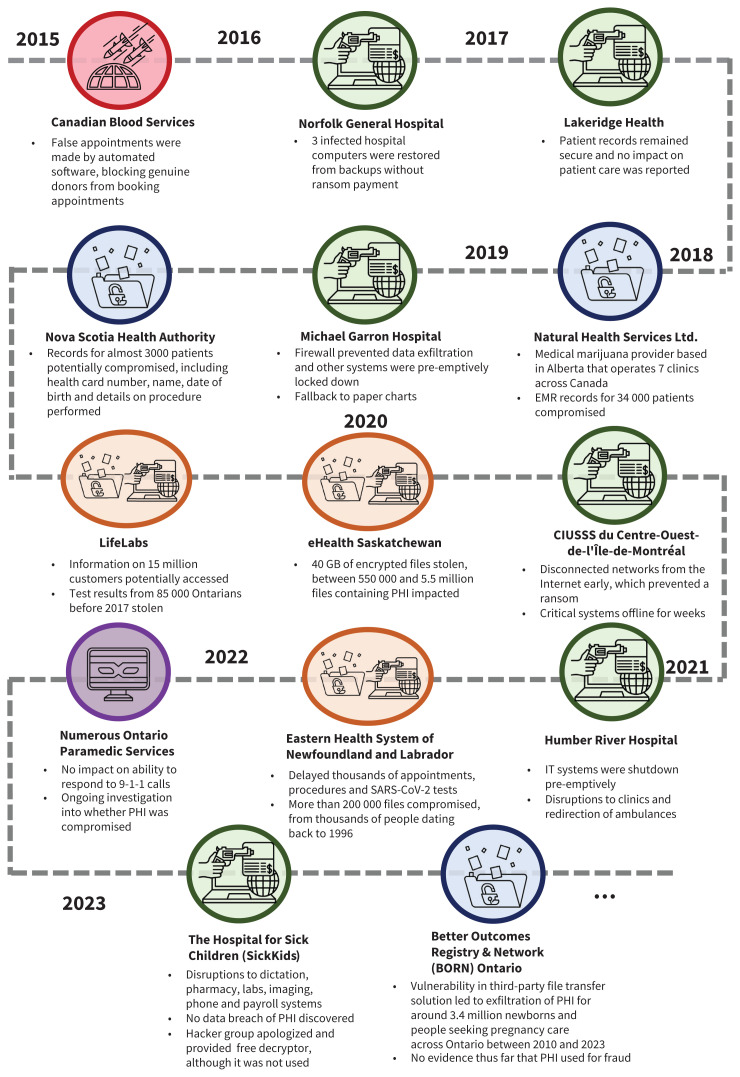
(NIH Cyberattacks on Canadian Healthcare Information Systems)
New advances in information and communication technologies like precision medicine, consumer health, virtual care, the Internet of Things, and Artificial Intelligence (AI), are revolutionizing health care as we know it. With these advancements come promises of driving efficiency, enhancing effectiveness, and improving healthcare outcomes. However, with each new innovation, comes new risks to the privacy and security of personal health information.
Privacy is not a Zero-Sum Game
Privacy does not need to be a barrier to innovation. Though the idea of privacy and innovation has formerly been discussed in combative terms, we do not need to give up improvements in health care to protect privacy. Privacy both can, and should be an enabler of, not an obstacle to innovation.
For example, by placing a focus on privacy, we increase patient trust, and with patient consent, health care providers and researchers can access richer datasets, which can allow greater room for the development of improvements in personalized treatments, advanced diagnostics, and AI-driven tools.
Privacy concerns can also be a major barrier to the adoption of digital health technologies, like telemedicine, wearable devices, and mobile health apps. However, with a strong focus on privacy protection, we can encourage the adoption of digital health tools such as these, improving care, and generating data that can be leveraged to develop innovative health solutions and improve care delivery models.
We can further drive progress by operating synergistically with regulatory standards, to safeguard the security and integrity of our data. By developing solutions that thrive within these frameworks, we can build interoperable systems that enable effortless data exchange while prioritizing privacy protection.
A focus on privacy protection establishes a solid foundation for innovation in health care by building trust, encouraging technology adoption, enabling secure collaborations, and driving the development of cutting-edge technologies. Organizations that prioritize privacy are better positioned to harness the full potential of health data in creating impactful solutions.
How to Build a Strong Culture of Privacy
Empowering your team with the knowledge and skills to protect sensitive information is the cornerstone of a strong privacy culture. More than 90% of breaches are caused by human error, however, employee privacy and security training can reduce security-related risks by 60%! (Privacy Horizon Inc.)
The NIHI McMaster CE ePrivacy Fundamentals Micro-Credential program equips participants with the foundation for a deep and comprehensive understanding of privacy principles, individual rights, and the responsibilities of healthcare providers and organizations through both Canadian and International privacy laws and information governance.
Instructed by Patrick Lo, CEO of Privacy Horizons and a seasoned expert with over 20 years of experience in information privacy, and Brendan Seaton, former Chief Creative Officer, Privacy Horizon Inc. and one of Canada’s top experts in eHealth risk management, with over 30 years of experience - “ePrivacy Fundamentals” is designed to foster a privacy-aware workforce by taking the foundational principles, and applying them to existing or new privacy programs, including those that incorporate AI technologies.
Program Overview
Privacy Fundamentals in Healthcare
Gain a solid understanding of privacy principles, individual rights, and the responsibilities of healthcare providers. This includes a focus on both Canadian and international privacy laws, ensuring a well-rounded perspective on privacy and information governance.
Designing and Implementing Privacy Programs
Learn to apply foundational privacy principles to create or refine privacy programs. This includes addressing modern challenges like incorporating AI technologies into privacy frameworks for healthcare organizations.
Understanding Privacy Legislation
Acquire the skills to identify and navigate privacy laws relevant to organizations and their clients. This competency ensures compliance with complex legal landscapes, both nationally and internationally.
Effective Breach Response
Develop the ability to respond swiftly and effectively to privacy breaches. This includes understanding risk management processes and implementing best practices to mitigate potential harm.
AI Risk Management and Governance
Explore the risks associated with AI in healthcare and learn best practices for its responsible deployment. Participants will understand how to integrate AI governance into privacy programs, ensuring ethical and secure use of technology.
Register yourself and/or your team for “ePrivacy Fundamentals” and to empower yourselves with the knowledge and skills to protect sensitive information now!
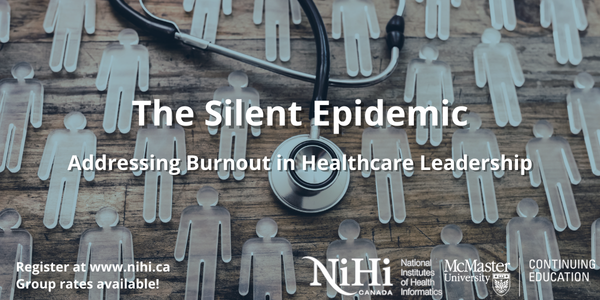
The Silent Epidemic: Addressing Burnout in Healthcare Leadership
Renee Sutton, Content and Media Specialisit; National Institutes of Healthcare Informatics
Raelynn Douglas, BA, MBA, CHE; CEO, Raesoleil Consulting, NIHI Instructor
Posted on: January 22, 2025
Burnout is no longer an issue confined to the bedside or the frontlines of health care. It’s a silent epidemic creeping into executive offices, eroding the resilience of healthcare leaders and threatening the well-being of entire organizations. For leaders tasked with navigating an industry marked by rapid change and high stakes, burnout has become a significant barrier to success.
A staggering 93% of health care executives admit burnout has negatively impacted their organizations, with nearly three-quarters personally experiencing it in the past six months (American Hospital Association). These statistics, though alarming, reflect the harsh realities of leading during times of unprecedented pressure. From staffing shortages to surging patient demands, today’s health care leaders are tasked with balancing heavy responsibilities while ensuring their teams and organizations thrive.
Why Burnout Demands Immediate Action
Burnout does more than drain energy—it drains effectiveness. Leaders facing emotional exhaustion often struggle with decision-making, team building, and fostering innovation. The ripple effects of burnout extend to entire teams, contributing to disengagement, low morale, and increased turnover. In short, when leaders burn out, organizations suffer.
The healthcare sector, already grappling with a global workforce crisis, cannot afford to lose its leaders to preventable stress. Addressing burnout isn’t just about individual well-being; it’s about safeguarding the future of health care.
Start with Self-Awareness, Develop a Strategic Action Plan, Build a Supportive Culture
Resilient leadership is the antidote to burnout. Leaders who embrace resilience prioritize self-care, build supportive environments, and equip themselves with strategies to thrive under pressure.
But building resilience requires intentional effort and the right tools. Resilience isn’t built on wishful thinking—it’s built on actionable steps. Crafting a clear plan with measurable goals and accountability mechanisms can help leaders stay focused and resilient, even in the face of adversity.
Understanding personal strengths, stressors, and limits allows leaders to address their challenges proactively. Guided self-assessments and resiliency plans, like those offered in the "Leadership in Health Care: Resilient Leadership" course, provide leaders with actionable insights to foster growth and balance.
Your Opportunity to Lead with Strength
Addressing burnout requires more than acknowledgment—it demands action. The "Leadership in Health Care: Resilient Leadership" program, offered by NIHI, in partnership with McMaster Continuing Education, is designed to equip leaders with the tools they need to overcome burnout and cultivate resilience.
With insights from Raelynn Douglas, a seasoned leader with over 20 years of leadership experience in the Ministries of Finance and Health, and of CEO, Raesoleil Consulting - a company designed to improve culture, employee engagement and retention, this course emphasizes strategies for self-care, team well-being, and effective leadership. Participants leave with a personalized resiliency plan and actionable strategies to inspire positive change in their organizations.
If you’re ready to combat burnout and build a healthier, more sustainable future for yourself and your team, this course is your first step. Don’t let burnout dictate the narrative of your leadership. Take charge, invest in your well-being, and lead with resilience.
Register today for "Leadership in Health Care: Resilient Leadership" and become the leader your organization needs.
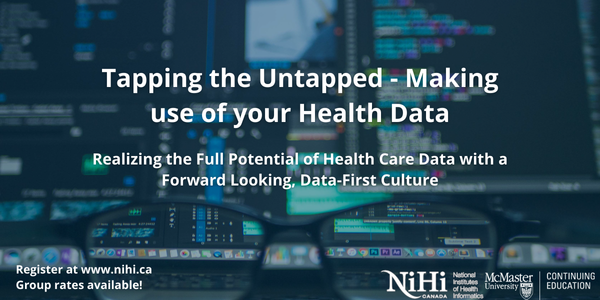
Tapping the Untapped - Making use of your Health Data
Renee Sutton, Content and Media Specialisit; National Institutes of Healthcare Informatics
Trevor Strome, MSc, PMP. Director, Information Technology, Winnipeg Airports Authority
Posted on: January 12, 2025
Health care is one of the largest data industries in the world, with data volumes doubling each year. However, according to the World Economic Forum, up to 97 percent of this data goes unused. It is spread across fragmented and unintegrated systems, and exists in a variety of differing formats and standards - presenting a missed opportunity to transform the quality, efficiency, and scalability of our strained health care system and care delivery landscape.
To realize the full potential of health care data, a comprehensive and forward-looking data strategy, backed by a data-first culture, and led by strong governance, is needed. Without it, the risk is a fragmented data landscape where data cannot be easily or effectively mined, correlated, or utilized to maximum benefit.
Data is the core driver behind advancements in evidence-based care, remote monitoring, and artificial intelligence - and exponential changes will continue to accelerate the pace of disruption - as well as widen the opportunity gap.
Current Challenges and Opportunities
The exponential growth of healthcare data presents both a challenge and an opportunity. The lack of effective use of data results in numerous detriments, such as inefficient workflows, reduced evidence-based decision making, and increased costs due to duplications or error.
An example of how tremendous these detriments can be is the fact that medical error is the second leading cause of death in Canada and the US, next to heart disease. Many medical errors could potentially be avoided if health data was more readily available and leveraged to its fullest potential to deliver evidence-based and streamlined care.
Fortunately, advancements in technology offer pathways to address these challenges. Tools designed to improve data access, visibility, and understanding can significantly ease the burden of data management. These solutions not only streamline clinical workflows but also enhance the delivery of care, paving the way for improved outcomes and reduced provider burnout.
For example, innovations such as artificial intelligence (AI) have the potential to unlock the value of this data, yet they also introduce complexities. Successfully integrating these technologies requires more than just technological adoption; it demands a comprehensive strategy that puts data first - ensuring consistency in data collection, standards, structure, and use - to create a cohesive and aligned data platform upon which data hungry technologies like AI can operate.
Organizations must commit resources and foster an enabling environment to ensure these advancements are implemented safely and equitably. Without this, the healthcare industry risks widening inequalities in access and outcomes, leaving resource-strapped organizations further behind.
How to Achieve a Data-Driven Culture
Building a data-driven culture is essential for healthcare organizations to leverage their data effectively. This transformation begins with fostering data literacy at all organizational levels. Employees must be empowered to turn data into actionable insights, not just through hiring technically proficient analysts, but by training all stakeholders to access, understand, and visualize data relevant to their roles. Skilled trainers can play a pivotal role in cultivating this culture, emphasizing the value of data literacy and enabling employees to champion data-driven principles within their spheres of influence.
Leadership engagement is another critical factor. A successful data driven culture must be driven from the top down, to create a unified vision for strategic and effective data governance across the organization. By prioritizing data value and insights, healthcare systems can address challenges such as clinician burnout and optimize care delivery.
Instructed by Trevor Strome, Director of Information Technology at the Winnipeg Airport Authority, formerly the Director of Analytics & Business Intelligence at the Winnipeg Regional Health Authority, and a top leader in Canada in Data Analytics, strategy and governance, with over 20+ years of experience - Data Strategy for Healthcare Organizations: Unlocking Value and Insight from Data provides a concise yet comprehensive overview of developing and implementing data strategies in the healthcare sector and provides a roadmap for achieving this culture including:
1. Data Governance and Security: Establishing robust frameworks for ethical data management ensures patient information remains secure and confidential.
2. Greater Data Awareness: Awareness of the human element in data strategy, including the identification of key roles and skills necessary for effective data management in healthcare, as well as the recognition of various technological tools and systems to support and enhance health care data strategies.
3. Leadership and Stakeholder Engagement: Building a data-centric culture requires aligning data initiatives with broader organizational objectives and engaging stakeholders at every level.
4. Responsible AI Practices: Leaders trained in ethical AI governance can evaluate tools for fairness, transparency, and alignment with patient-centered values.
5. Evidence-Informed Decision Making: By integrating analytics and AI, organizations can make data-backed decisions that enhance patient outcomes and operational efficiency.
This program offered by NIHI in partnership with McMaster Continuing Education equips participants with actionable strategies and health care specific examples, ensuring they are prepared to lead data-driven transformations. By achieving these competencies, organizations can unlock the potential of their data, enabling them to drive innovation, improve care delivery, and achieve equitable outcomes.
As the healthcare industry evolves, a data-driven culture is no longer optional—it is imperative for staying competitive and delivering on the promise of modern healthcare.
Register for “Data Strategy for Healthcare Organizations: Unlocking Value and Insight from Data” and to gain actionable strategies now!
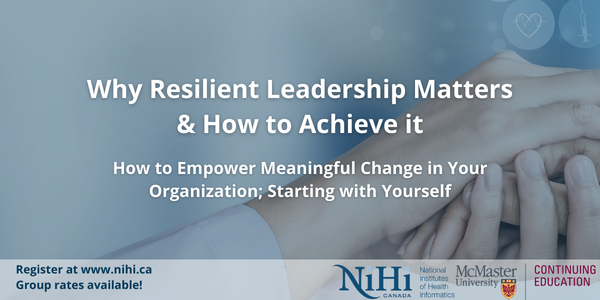
Why Resiliant Leadership Matters & How to Achieve it
Renee Sutton, Content and Media Specialisit; National Institutes of Healthcare Informatics
Raelynn Douglas, BA, MBA, CHE; CEO, Raesoleil Consulting, NIHI Instructor
Posted on: December 12, 2024
Before leaders can build great teams and strong cultures, they first need to take care of themselves. The dynamic and high-stakes world of health care requires leaders who are not only skilled, but resilient. In sports, the captain’s performance can set the tone for the entire team, and no team can succeed without a captain who is clear-headed, adaptable, and capable of leading under pressure. In the dynamic and high-stakes world of health care, resilient leadership plays the same role.
Why build these skills now? It is well known that health care is facing a particular challenge with increasing rates of stress and burnout, resulting in higher turnover rates. Resiliency skills can help us withstand and embrace change so we can thrive.
From managing team burnout, to building a positive workplace culture, resilient leadership is the foundation for thriving organizations. However, achieving this begins with the leader’s ability to prioritize their own well-being.
How do Leaders Build Resiliancy?
Building resilience takes time - focusing on self, forming new habits, shifting mindset and modelling behaviours others can follow. Once we have built a strong foundation for ourselves, we can support it in those around us and design a path for stronger teams and healthier organizations.
A leader’s ability to stay clear-headed and supportive under pressure can be the difference between a struggling team and one that thrives. The NIHI McMaster CE Leadership in Health Care: Resilient Leadership recognizes that great leadership starts from within, emphasizing self-care as the foundation for fostering stronger teams and healthier organizations.
Instructed by Raelynn Douglas, with over 20+ years of leadership experience in the Ministries of Finance and Health and of CEO, Raesoleil Consulting - a company designed to improve culture, employee engagement and retention - this course, “Leadership in Health Care: Resilient Leadership,” is designed to help you develop the skills and mindset needed to lead effectively while maintaining your own balance and health.
1. Enhance your Self-Awareness
Effective leadership starts with taking care of yourself, but taking care of yourself starts with a thorough awareness of your strengths and weaknesses. Through guided self-assessments and personalized resiliency plans, you will find out about strategies to address work-life imbalances, build healthier habits, and prioritize mental and emotional well-being, while learning how to shift your mindset to embrace challenges.
2. Understanding Resilience and Growth Mindset
Learn the essential elements of a growth mindset and how to model resilient behaviours. From setting boundaries to fostering open communication, you will gain actionable insights to inspire and support your team.
3. Create a Strategic Action Plan
Build a comprehensive leadership framework with specific actions, accountability mechanisms, and measures to track progress. This adaptable model will guide your personal growth and team development.
4. Fostering Personal Well-Being
Gain practical strategies to support well-being and resilience in the workplace, build stronger teams, improve culture and enhance the employee experience. This includes designing a personalized plan to achieve better work-life balance and healthier habits.
5. Master Essential Leadership Skills
Dive into key leadership competencies, including empathy, communication, and mentoring. With a focus on practical application, you will leave equipped with a toolkit to support well-being and resilience in the workplace, enhance the employee experience, reduce burnout, turnover, and enhance team morale.
Shape the Future of Health Care
Resilient leadership is not just about slugging tough times - it’s about thriving and enabling others to do the same. With burnout at an all-time high, and emotional wellbeing for workers in health care has become a necessity for organizational strength. By prioritizing your wellbeing, and building your leadership capabilities, you can model, and foster the stronger culture required for a healthier, and happier organization.
Leadership in Health Care: Resilient Leadership offered by NIHI in partnership with McMaster Continuing Education is your opportunity to gain the tools and insights necessary to lead with confidence and compassion. Don’t just respond to challenges—learn how to rise above them.
Register for Leadership in Health Care: Resilient Leadership and take the first step toward resilient leadership today.
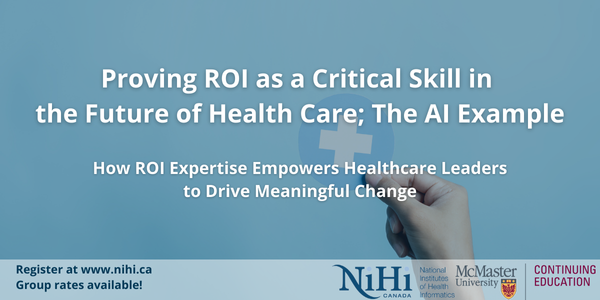
Proving ROI as a Critical Skill in Healthcare; the AI Example
Renee Sutton, Content and Media Specialisit; National Institutes of Healthcare Informatics
Suzanne Schell, CRP, BBA, CEO, ROI Institute Canada, NIHI Instructor
Posted on: December 3, 2024
Understanding how to measure the impact and Return on Investment (ROI) of initiatives and programs in health care is not a "nice-to-have" skill—it’s an essential capability. Health care organizations are under increasing pressure to find new ways to improve organizational effectiveness, reduce burnout, lower costs, and improve patient outcomes. This can become an overwhelming task, which demands new ideas, and new initiatives. It is crucial that we effectively justify the financial and operational value of new implementations. This ability not only improves program effectiveness and efficiency, but also fosters better relationships with stakeholders and secures continued funding.
By proving and calculating ROI, healthcare leaders can demonstrate value to stakeholders, drive informed decisions, and achieve organizational goals. Programs like ROI Fundamentals in Health Care provide participants with the Phillips ROI Methodology, a credible, practical process to assess and communicate the impact of their initiatives credibly . These skills are indispensable in navigating the complexities of resource allocation, justifying investments in innovation such as AI, and staying proactive in an ever evolving healthcare environment.
The AI Example
Innovations like artificial intelligence (AI) are at the forefront of current discussions, promising transformative advancements that could profoundly improve various aspects of health care. From enhancing accessibility, to optimizing sustainability - AI holds the potential to revolutionize how care is delivered. Yet, translating its abstract promises - like improved quality, efficiency, and productivity - into measurable outcomes presents a significant challenge. It requires tackling hard questions: Which metrics accurately evaluate AI's impact? How do we assign value to constructs such as care quality or clinician wellness in a landscape where healthcare data is often siloed and incomplete?
This complexity doesn't diminish the value of AI in healthcare, but it does highlight the hurdles in demonstrating a clear return on investment (ROI). As the initial excitement surrounding AI wanes, and fear of missing out gives way to pragmatic scrutiny, ROI pressures will intensify. Success will depend on aligning AI innovations with actionable, well-defined goals while addressing the nuanced realities of healthcare delivery and measurement.
Your Next Step: Return on Investment (ROI) Fundamentals in Health Care
Mastering the measurement of value, and impact, is an indispensable skill in today’s healthcare landscape. ROI Fundamentals in Health Care equip professionals with how to use the Phillips ROI Methodology to navigate the challenges of justifying new initiatives. This course enables participants to not only quantify value, but also align innovative solutions - like AI - with the strategic goals of their organizations.
Throughout ROI Fundamentals in Health Care, participants explore a practical methodology and tools, gaining the expertise needed to measure value, communicate, and maximize the value of healthcare initiatives.
1. Foundational Understanding of ROI in Healthcare - Gain a comprehensive understanding of the Phillips ROI Methodology, including its five key levels of evaluation. Learn how to define measurable goals, align initiatives with organizational priorities, and establish the frameworks necessary to track success and drive accountability.
2. Strategic Benefit and Impact Analysis - Delve into the complexities of isolating program benefits from other influences, and master strategies for conservatively converting impact measure improvements into monetary value.
3. Effective Stakeholder Communication - Develop the skills needed to clearly articulate the value of programs to stakeholders, from senior leadership to clinical teams. Learn how to foster stakeholder buy-in and ensure continued support for transformative initiatives.
4. Practical, Impact-Focused Learning - Through real-world examples, participants gain practical knowledge in applying ROI principles to diverse healthcare scenarios. Whether evaluating patient-centered care models or assessing new operational processes, this practical approach ensures readiness to lead impactful programs.
5. Staying Ahead in a Competitive Landscape - As healthcare becomes increasingly data-driven and resource-constrained, professionals with ROI expertise are better positioned to lead effectively. This course prepares participants to remain proactive and agile in navigating the evolving demands of healthcare organizations.
By completing this program, participants gain the tools to justify and enhance the impact of innovations, improve organizational effectiveness, and deliver better outcomes for patients and providers alike. NIHI's ROI Fundamentals in Health Care course equips today’s healthcare leaders with the skills needed to excel in an increasingly complex and dynamic field.
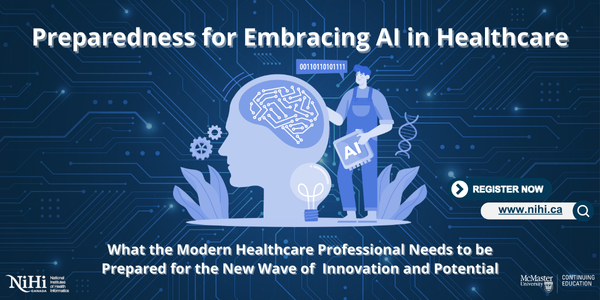
Preparedness for Embracing AI in Healthcare
Renee Sutton, Content and Media Specialisit; National Institute of Healthcare Informatics
Posted on: November 25, 2024
The healthcare landscape is undergoing a seismic shift, with Artificial Intelligence (AI) emerging as a cornerstone of innovation. From revolutionizing diagnostics, to streamlining administrative workflows, AI has shown immense potential in improving outcomes across every facet of healthcare. Physicians and clinicians can now leverage AI to integrate vast amounts of data, enabling faster, more accurate decisions under the pressures of modern medical practice.
Beyond clinical applications, AI holds promise in achieving the healthcare industry's Quintuple Aim: better health, improved patient experience, enhanced clinician well-being, reduced costs, and greater health equity. Yet, this rapid transformation is not without challenges. The deployment of AI raises ethical questions, such as liability for errors, and the management of sensitive health data. Moreover, thoughtful regulation is crucial to balance innovation with concerns about privacy, security, and equity.
The future of AI in healthcare is more than just promising—it is a call to action for professionals to be ready to shape the next generation of medical care.
How Will “Artificial Intelligence in Health Care” Help?
This course educates healthcare providers on the basics of AI and how it works, key challenges, considerations, and best practices for adopting AI in a way that is safe, effective, and secure. Even technology developers can learn beneficial knowledge about the rapidly evolving regulations surrounding AI as a medical device, and changes in the legal and privacy/security landscape - as well as how healthcare organizations can most effectively implement AI.
Throughout the course we look at practical examples across various facets of healthcare, and learn how to apply different tools to assist in AI strategy development, implementation, and ongoing monitoring.
1. Understanding the Basics - Participants completing this course will gain a comprehensive understanding of the three main areas of Artificial Intelligence (AI) - narrow, general, and super, Machine Learning, Neural Networks, Natural Language Processing and Deep Learning, within the context of healthcare. It will explore related fields, including the use of robotic technologies, clinical decision support, and electronic medical records.
2. Implementing Trustworthy AI - Delve into the ethical dilemmas and regulatory frameworks shaping AI applications, alongside other crucial pillars like transparency, fairness, reliability, robustness, accountability, and privacy. From understanding data governance to managing liability, you'll gain the insights needed to navigate the complex landscape of AI with confidence and integrity.
3. Practical, Stakeholder-Focused Learning - Explore how AI technologies impact various stakeholders—clinicians, patients, payers, and even investors. By understanding diverse perspectives, you'll be equipped to implement AI solutions that resonate across the healthcare ecosystem.
4. Real-World Applications - Learn from real-world case studies and insights from industry thought leaders. This hands-on approach helps you connect theoretical knowledge with practical implementation, ensuring you're ready to lead AI initiatives in your organization.
5. Stay Ahead of Industry Trends - As AI continues to disrupt healthcare, staying informed and skilled in its latest advancements is crucial. This course positions you at the forefront of innovation, ready to harness AI’s potential for improved care and operational excellence.
As healthcare embraces AI, the focus must remain on creating solutions that address real-world problems. Artificial Intelligence in Health Care offered by NIHI in partnership with McMaster Continuing Education, offers exactly what the modern healthcare professional needs to be prepared for this new wave of rapid innovation and potential.
Shape the Future of Healthcare
The integration of AI in healthcare is not just a technological evolution—it’s a paradigm shift that demands informed and skilled professionals. By enrolling in the AI for Health Care course, you'll gain the expertise to navigate this new era confidently. Don't just witness the future of medicine—become a leader in its transformation.
How to be an Active Player in Analytics Transformation in Your Organization
Trevor Strome, MSc, PMP; Manager, Digital Airport Solutions, Winnipeg Airports Authority; Assistant Professor, Department of Emergency Medicine, College of Medicine, Faculty of Health Sciences, University of Manitoba; NIHI Instructor.
Posted on: July 6, 2021
The ever-changing field of data analytics, and its many disciplines (such as data engineering, data science, and data analysis), is becoming ever more important to decision makers within healthcare organizations. To be an active player in this "analytics transformation" within your organization, and to ensure your knowledge and skills in this area remain current, it is important and necessary to engage in ongoing continuing education in the data analytics field. This article will touch on just a few of the benefits of keeping your knowledge and skills in this field current.
Online training helps enhance your current skills. Whatever your job function in data analytics, there are likely changes in tools, technologies, and best practices that you need to keep up-to-date. Staying current in your field will, at the very least, help you get the most out the data and analytics tools you use and benefit from advances in technology. For example, if you have been using a spreadsheet as a primary tool for creating and disseminating reports and dashboards, you may be missing out on many of the data integration, visualization, or collaboration features that many modern Business Intelligence (BI) tools (such as Tableau or MS PowerBI) have to offer. Not only will gaining improved insight into your data become possible, but your productivity might skyrocket as you benefit from "wrangling" with data less and analyzing data more. Or, rather than using .CSV (text) files to exchange data, have you considered that there are many other database and/or data integration tools that can help you share data in ways that is more secure than sending text files?
Online training helps you learn new skills and explore different disciplines within analytics. Sometimes we "don't know what we don't know" - and that fact is certainly true in data analytics. But learning about other, related, disciplines in your field can open the door to new job opportunities and help you work better with others in your extended data analytics team. For example, if you specialize in data analysis and visualization, understanding the data and information requirements of Lean practitioners can improve your ability to provide meaningful data products (such as reports or dashboards) in a format targeted to their needs. Or understanding the basics of data pipelines (built by data engineers) can allow you to collaboratively work to improve data quality.
Online training helps your organization generate more value to those it serves. No matter whether you are a junior data analyst or Chief Information Officer (CIO), you are critical to the ongoing data-driven transformation in healthcare, potentially achieving breakthroughs in improved finances and improved productivity - all through enhanced insight made possible with analytics. Meaningful and significant change happens at all levels in a healthcare organization when knowledge, skills, and experimentation (fuelled by ongoing education!) is allowed to thrive. There are many ways that analytics can generate value. The more that you understand about the field of analytics, the more value that you will be able to generate - to your organization, and perhaps most importantly to the patients and other clients it serves.
If you are interested in launching your healthcare analytics career, or taking your career to the "next level", enroll in the NIHI Healthcare Data Analytics courses (See www.nihi.ca). Our unique program consisting of pre-recorded modules you can view at your own pace combined with live sessions where you can interact with the instructor and your peers will help expand the skills you already know and learn the skills you need know in a modern analytics-driven organization.

Healthcare organizations are rich in data, but without the right tools, this wealth of information can go underutilized. As digital transformation accelerates, healthcare leaders must harness data effectively to make informed, strategic decisions. The key to this lies in the development of effective data visualization tools—interactive and user-friendly dashboards that provide real-time insights, improve operational efficiency, and enhance patient care.
The Role of Dashboards in Healthcare Decision-Making
Dashboards are more than just displays - they bridge the gap between raw data and actionable insights. By consolidating data from various sources, they enable healthcare leaders to track trends, identify inefficiencies, and make data-driven decisions that enhance organizational performance. A well-designed dashboard ensures that complex healthcare data is not just available but is also comprehensible, accessible, and actionable.
Key Challenges and Opportunities in Dashboard Development
While dashboards offer immense benefits, their development is not without challenges. Healthcare organizations must navigate issues such as data integration across different systems, ensuring user adoption, and designing dashboards that provide meaningful insights rather than just presenting overwhelming amounts of data. Opportunities lie in employing best practices in UI/UX design, leveraging iterative development methodologies, and focusing on data storytelling to improve engagement and usability.
Essential Components of Effective Healthcare Dashboards
-
Iterative Dashboard Development Methodology: A structured approach that allows for continuous refinement based on user feedback.
-
Consumer-Driven Data Visualization Framework: A methodology for gathering user requirements and designing dashboards that cater to the needs of healthcare professionals.
-
Foundations of Data Storytelling: Creating dashboards that not only present data but also provide context and meaning.
-
UI/UX Principles and Wireframing: Ensuring that dashboards are intuitive, user-friendly, and accessible to a diverse range of healthcare professionals.
-
Data Visualization Selection Process: Choosing the right types of charts, graphs, and visual elements to best represent healthcare data.
-
Dashboard Layout & Structure with the Guided-Analytics Approach: Organizing dashboard components to facilitate a seamless user experience.
-
User Training & Dashboard Sustainment: Implementing strategies to ensure healthcare professionals can effectively use and maintain dashboards over time.
-
Measuring Adoption & Governance of Dashboards: Ensuring the long-term success of dashboards through structured evaluation and governance models.
Why Healthcare Professionals Need to Master Dashboard Development
Understanding the development and implementation of effective dashboards is essential for healthcare professionals involved in decision-making. Interactive dashboards not only enhance data interpretation but also promote collaboration among clinicians, administrators, and data analysts. Mastering dashboard development allows professionals to:
-
Prepare dashboards that facilitate data-driven decision-making in healthcare organizations.
-
Showcase data visualization techniques to effectively communicate with data.
-
Demonstrate effective change management practices for dashboard adoption.
-
Identify the critical inputs, enablers, and context in dashboard development that generate tools healthcare leaders will actually use.
-
Learn from real-life case studies how dashboards have been successfully deployed to improve performance in healthcare settings.
-
Understand analytics team governance and how to lead teams in developing dashboards that healthcare leaders actively seek out.
Learn How to Build and Implement Effective Dashboards with NIHI
The National Institutes of Health Informatics offers a specialized program designed to provide healthcare professionals with practical skills in dashboard development. Development of Effective Dashboards for Health Care outlines a structured approach to designing, implementing, and adopting dashboards that healthcare leaders will actually use. This program covers:
-
Best practices for dashboard development and strategies for successful adoption.
-
Agile project management techniques for building effective healthcare dashboards.
-
AI and big data analytics in healthcare.
-
Dashboard design principles for intuitive data visualization.
-
Electronic health records (EHR) integration.
-
Privacy, security, and compliance in digital health.
-
Practical applications of interactive dashboards in healthcare management.
By mastering these skills, healthcare professionals can leverage data visualization to drive efficiency, improve patient outcomes, and enhance organizational performance.
Stay ahead of the decision-making process—enrol in the NIHI health informatics course today and take control of healthcare data with effective dashboard development!

Find Clarity in the Complexity of Health Data Privacy
Renee Sutton, Content and Media Specialisit; National Institutes of Healthcare Informatics
Posted on April 18, 2025
Like the quiet simplicity of a zen garden, understanding privacy can be a process of clearing away what’s unnecessary, and focusing on what truly matters. That’s the goal behind ePrivacy Risk Management—a micro-credential program designed to bring clarity to a complex subject.
This course offers more than just checklists and policies. It helps you build a practical understanding of how privacy principles apply to real-world healthcare settings. Whether you're managing patient data, working with digital tools, or leading a team through a privacy audit, you’ll walk away with confidence and clarity.
You don’t need to be a legal expert or a tech expert to benefit. You just need a willingness to learn the essentials—and a little guidance in organizing them.
What You’ll Gain:
- Guidance in tools like PIA and Risk Management Assessment
- A grounded understanding of privacy legislation in Canada
- Insight into risk management practices tailored to healthcare
- Tools to support ethical, compliant data handling
- Confidence in addressing privacy challenges in a digital-first environment
Why It Matters
Health data is personal, powerful, and sensitive. Mishandling it can damage trust, affect outcomes, and bring real-world consequences. The best time to build your foundation in privacy? Before you’re faced with a crisis.
This course gives you the tools to feel prepared, not panicked.
A Simpler Way Forward
Just like raking lines in sand or placing stones with intention, building privacy literacy is about slowing down and setting the right foundation. When you understand the landscape, you can move through it with purpose—and help your organization do the same.
Ready to find clarity in the complexity?
Register now for the ePrivacy Risk Management micro-credential program.

Find Clarity in the Complexity of Health Data Privacy
Renee Sutton, Content and Media Specialisit; National Institutes of Healthcare Informatics
Posted on April 18, 2025
Like the quiet simplicity of a zen garden

Why Now Is the Time to Register for the ePrivacy Risk Management Course—Especially as a Group
Renee Sutton, Content and Media Specialisit; National Institutes of Healthcare Informatics
Posted on April 9, 2025
Earlier this month, news broke that a data breach involving a regional health



